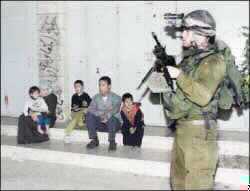- Author:
& News Agencies - Section:
WORLD HEADLINES
- Hajj & Umra WORLD HEADLINES
Sharon calls for extended Israeli rule in Hebron, as settlers move in

Prime Minister Ariel Sharon said that Israel must enlarge the zone it administers in the divided West Bank city of Hebron following an attack which killed 12 Israelis and which triggered a major reoccupation of the city.A day after Israeli occupation forces swarmed back into the Palestinian-administered areas of the flashpoint city which it had quit just weeks ago, Jewish settlers started doing just that, establishing a wildcat outpost between the established settlement of Kiryat Arba and the city itself, a settler leader said.
Sharon said during a tour of the city that the occupation army must ensure territorial continuity between Kiryat Arba on the eastern edge of Hebron and Jewish enclaves in the city centre around the disputed shrine of the Tomb of the Patriarchs, public radio said.At the same time, Hebron's settler leader, Zvi Katsover said dozens of youths had already moved in to set up a wildcat outpost -- the basis for a future settlement -- between the two.
"We have created a new settlement outpost, and it would have been a historic sin not to have made use of this occasion," said Katsover, referring to the Islamic Jihad attack on Friday night which killed 12 people, including three settlers, and has been dubbed the Sabbath Massacre.
Just hours after the attack, Israeli armoured vehicles piled back into Palestinian-administered zones of the city of more than 120,000 people.Israel has always assured the administration of Palestinian neighbourhoods hard by the heavily guarded Jewish enclaves in the city centre where some 600 hardline settlers live.
But after two years of bitter conflict with the Palestinians, Israel's right-wing government says the 1993 accords which laid down that division are dead.Since Israel's national unity coalition collapsed last month after the centre-left Labour party walked out, there have been increasing calls for a tougher response to Palestinian attacks, especially after a shooting last week at a kibbutz inside Israel, which killed five people, including two small children.
But Sharon has tried to stick to his course of not over-reacting to the attacks, the latest of which targeted a route used by Jews going to pray at Hebron's Tomb of the Patriarchs, a shrine sacred to both Jews and Muslims.Sharon is wary of incurring US anger by stirring up tensions in the region as Washington piles pressure on Iraq.
His newly appointed Foreign Minister Benjamin Netanyahu, however, has wooed the powerful right wing of the two leaders' Likud party by calling for Palestinian leader Yasser Arafat to be expelled.Sharon and Netanyahu will vie for the party's leadership at primary elections at the end of the month, with the winner tipped to emerge as the new prime minister after snap parliamentary elections in January.Netanyahu reiterated his tough line Sunday before a cabinet meeting to decide what further action should be taken.
"I have explained that if the terrorism continues, Arafat will be expelled and that his regime will be ended," Netanyahu told public radio."The right moment for his expulsion will be decided by a select group," he said.
"All the accords agreed by Israel have been annulled by Arafat himself. I have always believed that the application of accords requires reciprocity.
"Netanyahu said he had spoken with US Secretary of State Colin Powell and explained that in return for Israel's pullback from Palestinian-administered areas of Hebron, the Palestinian Authority had promised to maintain order.
"In fact the opposite has happened because Arafat is the problem and not the solution," he said.
Israel blames Arafat -- a virtual prisoner in his Ramallah offices, where he has been pinned down for almost a year -- for failing to crack down on Palestinian resistance men, including Islamic Jihad, which claimed Friday's ambush.
Islamic Jihad and its larger Islamist rival Hamas are in opposition to Arafat and denounced the Oslo accords he signed.
Netanyahu promised further tough measures in Hebron, which along with the rest of the West Bank was reoccupied by the occupation army in June after a spate of resistance bombings.
"We are going to cleanse the whole area and do the work ourselves," he said.Israeli occupation forces also reoccupied the centre of the northern West Bank city of Nablus after the kibbutz killings last week, carrying out extended operations based on a two-week search of Jenin which led to the slaying of an Islamic Jihad leader on November 9.Friday's attack in Hebron was revenge for that killing, according to Islamic Jihad, which lost three of its gunmen in a prolonged shootout that killed eight Israeli occupation soldiers, a policeman and three settler security guards.
PHOTO CAPTION
An Israeli soldier stands guard in front of a Palestinian family
Related Articles
 Hajj virtues
Hajj virtues
-
School of Faith in Ten Days of Thul-Hijjah
The believing human self needs strong provocations in order to awaken whenever it is enveloped by laziness in...
-
The Status of Hajj in Islam
Hajj is the fifth pillar of Islam; Allah, The Exalted, ordained it in the ninth year after Hijrah (the Prophet's,...
-
School of Faith in Ten Days of Thul-Hijjah
The believing human self needs strong provocations in order to awaken whenever it is enveloped by laziness in relation...


 Home
Home Discover Islam
Discover Islam Quran Recitations
Quran Recitations Lectures
Lectures
 Fatwa
Fatwa Articles
Articles Fiqh
Fiqh E-Books
E-Books Boys & Girls
Boys & Girls  Hajj Rulings
Hajj Rulings Hajj Fatwas
Hajj Fatwas












